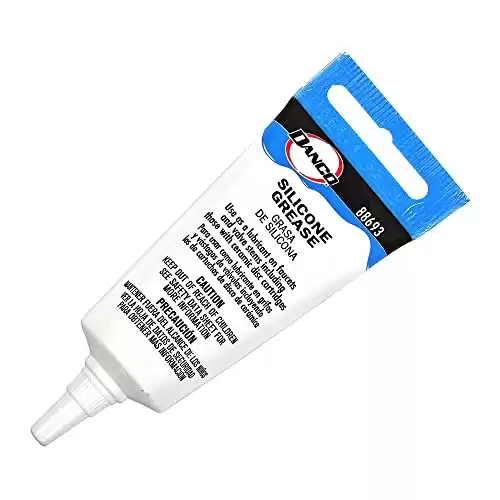You hear a squeak in the shower. Your first thought is a mouse is running rampant ready to take over while you’re trying to get your scrub on. Do Not panic! It’s most likely your shower faucet squeaking and not a fuzzy pest.
Shower faucets can get squeaky when dirt and debris build up inside of them. If your faucet is older, this is probably the culprit causing the horrendous squeaking. Faucets need cleaning once in a while to get rid of buildup, and it’s recommended that you apply a little plumber’s grease.
What Is Plumber’s Grease?
So, what the heck is plumber’s grease, anyway? Plumber’s grease is a waterproof product made of silicon oil and grease. It looks and feels like Vaseline, but don’t be fooled. Plumber’s
It’s used for lubricating faucets and other plumbing fixtures to increase product life and prevent issues like that annoying squeaking.
What Is Plumber’s Grease Used For?
As we mentioned earlier, plumber’s grease is primarily used for all kinds of faucets. If you are having an issue with a stiff or squeaking fixture, taking apart the faucet and applying plumber’s
Most new plumbing fixtures come “pre-greased” but some faucets and shower heads will recommend applying a little silicon grease to the moving parts to allow ease of operation and prevent any annoying squeaking from occurring. Check with your fixture’s manufacturer for recommended lubrication points.
Plumber’s grease is also used by, well, plumber’s for O-rings, gaskets, cartridges, handles, swivel joints and other moving parts on plumbing fixtures like toilets, showers, and faucets. Because it’s safe for potable water you’d be surprised at all the plumbing places that could use a little lubrication!
Is There A Substitute For Plumber’s Grease?
If you’ve for a squeaky faucet you want to fix immediately, you might be searching for an alternative to the silicon plumber’s grease. Unfortunately, if you want to do it properly there is no substitution for the real deal.
Avoid Vasoline
We mentioned Vaseline is similar, but since most faucet seals and O-rings are made of Nitrile Butadiene Rubber, Vaseline can break down the products in it and ruin the seals.
Other products that might seem like they could work are olive oil and WD-40. Do not use these. They are very thin and won’t stay in place. You’ve got to use the real silicon plumber’s grease in order to prevent having to reapply and making sure it is working properly.
How To Use Plumber’s Grease
Alright, now that we know we have to use the good stuff, how do we use it? Well, it’s fairly simple. Nowadays, most faucets have cartridges inside, so you will have to take it apart to apply the grease. Doing this regularly to your faucet handles and cartridges will make the fixture preform better, prevent stiffness, and will prevent buildup and rust from happening.
Routine lubrication of the faucet will also prevent the dreaded squeaking. Here’s how you do it:
- First things first, you’ll want to turn the water supply to that faucet OFF. There should be a switch under the counter or nearby to close the valves.
- Remove the handles if you’re lubricating a sink with plumber’s grease. This will look different depending on the design. Once you find the screws, unscrew them to remove.
- Remove the nozzle
- If this is a shower valve, you will have to take it apart with screws to get inside to the cartridge area to apply the plumber’s grease.
- Apply the silicon plumber’s grease to the rubber ring area, and reassemble. Depending on what you are applying it to, this process will look different.
Ideal for lubricating faucet stems valves and cartridges.
If you are unsure of what to do, you can always call a plumber to help you!
Plumber’s
Conclusion
To sum it up, if you have faucets, you should be using silicon plumber’s grease. Even if you aren’t experiencing the terrifying squeak that can occur, it can be prevented. With a little plumber’s lubricant, you lubri-can prevent wear and tear and increase the longevity of your faucets, too!
Happy Plumbing!
Recommended Reading
How To Repair A Garden Hose
Nothing ruins your outdoor fun faster than a leaking garden hose. Save money and your hose by fixing it yourself in five minutes flat!
How To Fix Annoying Clogged Shower Drains
Using a clogged shower is disgusting, you are standing in a puddle of your own dirt, yuk! We will show you 10 DIY ways to unclog your shower drain!
How To Unclog A Toilet With Or Without A Plunger
We will show you how to quickly unclog a toilet with a plunger and 11 clever ways to clear a toilet if you don't have a plunger handy.
How To Test Your Sump Pump
Just an inch of excess water can cause over $1000 to the average home! Luckily, a simple test can save you from a flooded basement.
How To Install A Toilet
Installing a toilet might seem like a daunting DIY project, but it's really quite simple. Our guide will have you flushing a new toilet fast!
How To Fix A Leaking Hose Bib
Don't let a leaky hose bib ruin your summer. We will show you how to fix your outdoor faucets so you can get back to having fun in the sun!

